
Intoxilzyer 8000
Answer: Scientists involved in the prosecution of drunk and drugged driving and global warming both use science and scientific principles to make their case. Some also believe that both misuse science and hide the truth in order to mislead the public.
Regarding global warming this point is made in an article entitled Secrecy in science is a corrosive force recently posted to the Financial Times web site by reporter Michael Schrage[i]. In this article Mr. Schrage asserts that “[S]cientists aggressively promoting pet hypotheses often relish the opportunity to marginalize and neutralize rival theories and exponents.”
Interestingly, this is exactly what happens in the court room when drunk driving cases are tried. The difference is that the scientists involved in drunk driving are not called “climatologists” they are called “forensic scientists” and their pet hypotheses do not involve global warming, but instead involve things like breath and blood testing and alcohol metabolism. And, while forensic scientists do not have the U.N. to advocate on their behalf, they do have prosecutors and sometime even judges, who actively seek to marginalize and neutralize rival theories concerning how breath and blood testing is sometimes inaccurate and unreliable or why retrograde extrapolation is simply guesswork.
In his article Mr. Schrage states that “[S]ecrecy, not privacy, is at the rotten heart of this bad behavior by ostensibly good scientists.” To attorneys involved in the defense of drinking drivers this statement sound eerily familiar. All too often it seems that police agencies and state forensic laboratories do everything in their power to keep secrets about what they do behind closed doors. Take for example the source code debate where CMI, the manufacturer of the breath test machine known as the Intoxilyzer, is doing everything possible to keep the inner workings of their machines secret.
The same is true of Borkenstein Alcohol Highway Safety Class offered by Indiana University. This is the course where forensic scientists around the country are taught the science behind breath and blood testing and alcohol metabolism. Defense attorneys are not allowed to attend this class. In Michigan, defense attorneys are likewise not allowed to take the training given to police officers relative to using the DataMaster, Michigan’s breath testing machine. Interestingly, prosecutors are allowed into both classes.
Mr. Schrage goes on to ask the following series of rhetorical questions relative to global warming and all of them apply equally to the science ostensibly behind the prosecution of drunk driving cases:
Why should research funding institutions and taxpayers fund scientists who deliberately delay, obfuscate and deny open access to their research? Why should scientific journals publish peer-reviewed research where the submitting scientists have not made every reasonable effort to make their work – from raw data to sophisticated computer simulations – as transparent and accessible as possible? Why should responsible policymakers in America, Europe, Asia and Latin America make decisions affecting people’s health, wealth and future based on opaque and inaccessible science?
It is impossible for a defense attorney to get inside the Michigan State Police Toxicology Laboratory where blood testing is performed on ALL drunk driving cases in Michigan. It is equally impossible to obtain the “research” and raw data on which Michigan’s forensic scientists base their opinions about such things as the reliability of their test results. They refer to this research as “proprietary” and therefore not discoverable in a criminal case.
There have also been instances where scientists who have researched breath and blood testing and written articles that take a position contrary to the majority opinion about the reliability of these tests have been denied access to peer-reviewed journals. I’m quite sure Mr. Schrage would agree that this all sounds an awful lot like the global warming debate.
A critical point made by Mr. Schrage is this: “The issue here is not about good or bad science, it is about insisting that scientists and their work be open and transparent enough so that research can be effectively reviewed by broader communities of interest. Open science minimizes the likelihood and consequences of bad science.”
Again, the same is true in drunk driving cases where open science would minimize the likelihood of wrongful conviction. Unfortunately, the science behind drunk driving cases is anything but open and transparent. Instead, the goal in the vast majority of police agencies and forensic laboratories has been to provide defense attorneys with as little information as possible.
Just as Mr. Schrage argues relative to global warming; in the prosecution of drinking drivers “when doing important research about the possible commission of crime scientists should have nothing to hide. Their obligation to the truth is an obligation to openness.” The problem is that by excluding defense attorneys such scientists raise at least the appearance of impropriety.
The theory of global warming is not very old, and in part it is the newness of the theory that causes so much debate. The theory has not been vetted the way so many other theories have been throughout the ages.

drunkometer - an early DUI breath test device
Just like global warming, breath and blood testing in drunk driving are relatively new sciences. As Pennsylvania DUI Defense Attorney Justin McShane pointed out in his recent blog:
Breath testing really came into widespread use in 1954 when Professor Robert F. Borkenstein of Indiana University invented the Breathalyzer. This was the first practical instrument for testing breath alcohol and a great improvement over the somewhat older Drunkometer, which required frequent re-calibration.
The forensic science behind blood testing is even “newer” than Breathalyzer technology. Blood testing for alcohol drunk driving cases typically uses a process called headspace-gas chromatography (HS-GC), which did not become popular in the United States until 1967.
The technique of gas chromatography was originally invented by Professor G. Machata of the University of Vienna in Austria. The proper instrumentation for the practical realization of the technique was developed by Perkin-Elmer’s German affiliate, using a unique pressure-balanced, time-based sampling of the headspace of the thermostatted sample vials. The first instrument, the Model F-40 was introduced in the fall of 1967; it was then followed by the Model F-42 in 1975 and the Model F-45 in 1978.
There is little doubt that the newer the science the more need for debate, and while there is little debate in the scientific community about gas chromatography, this does not mean that there is no need for openness.
There same cannot be said regarding breath testing in drunk driving cases where considerable debate remains. Ironically, most state’s breath testing programs are even less transparent than what occurs with most forensic laboratories.
An open question with drunk driving is identical to the open question in global warming. If the scientists have nothing to hide, why are they behaving as if they do?
[i]Michael Schrage is a researcher at the MIT Sloan School’s Center for Digital Business and a visiting fellow at Imperial College of Business School in London. He is the author of Serious Play (Harvard Business Review, 2000) and the forthcoming Getting Beyond Ideas (Wiley, 2010)










{ 2 comments… read them below or add one }
Our very good friend and close colleague, Ron Moore of California recently commented on the broader aspect of this issue when he said:
"So you are looking for a new era of scientific integrity after the NAS report? Won't happen. There is no such thing as scientific integrity, only human integrity practiced in the area of science. And human integrity always has been what human integrity always will be: subject to failure."
Truer words have not been spoken. It seems a shame that in the applied filed of "forensic science" the basic principle of general science is lost–that is openness.
Great post.
—-
-Justin J. McShane, Esquire Pennsylvania DUI Attorney
Re: Michigan DUI Help – New comment requires moderation on: What do Global Warming and Drunk Driving Defense Have in Common?
Approve
{ 5 trackbacks }